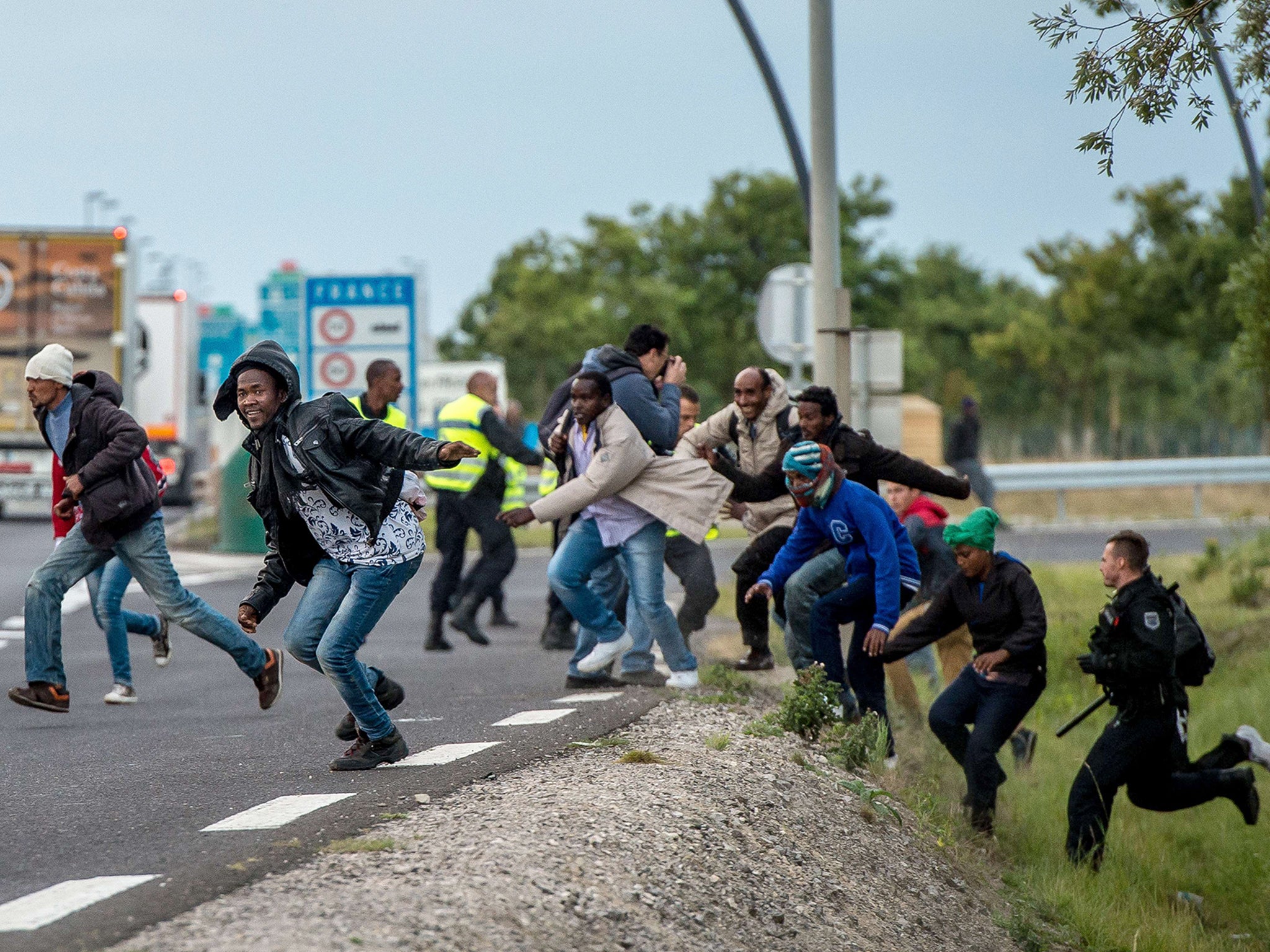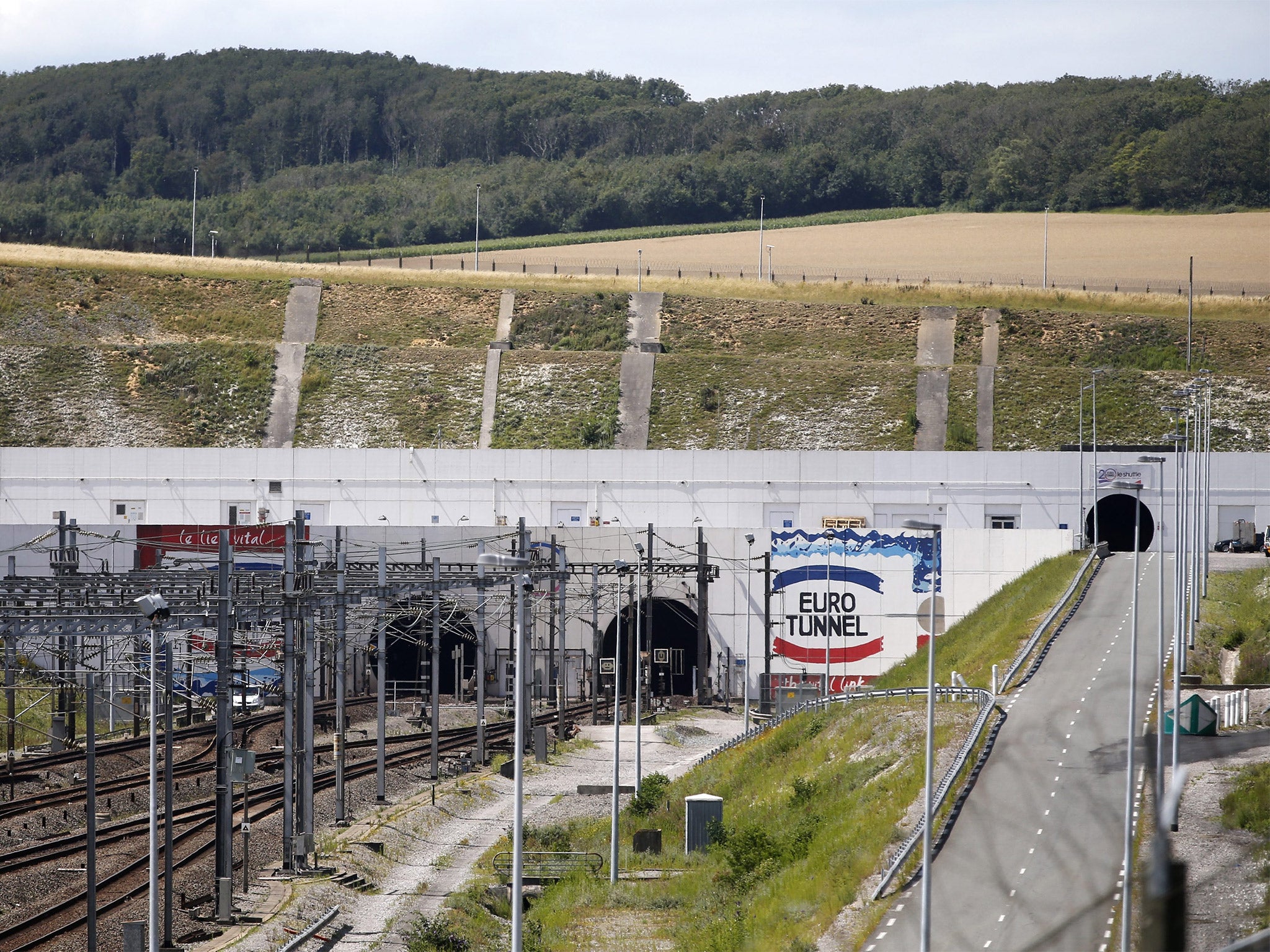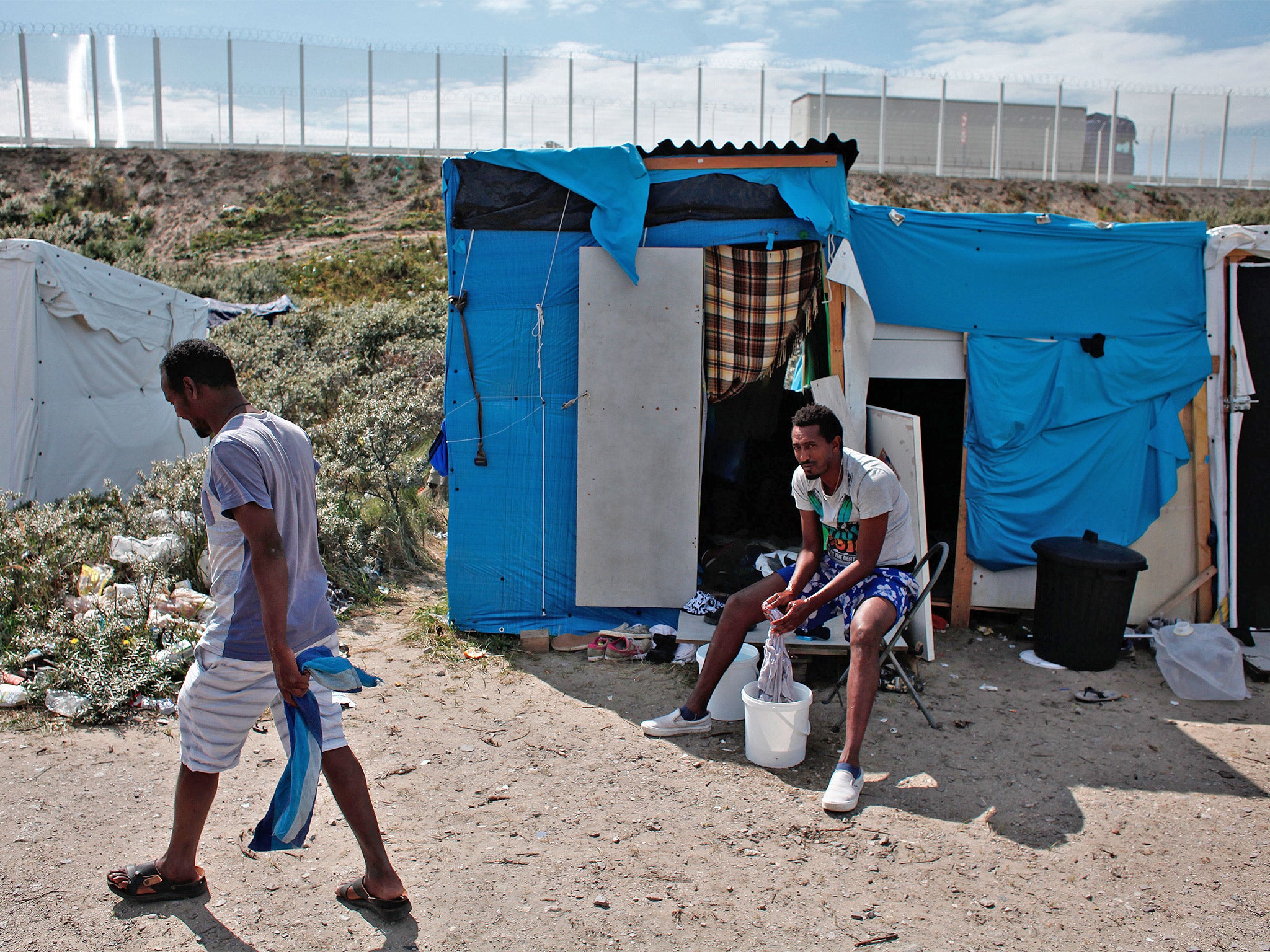Calais crisis: For desperate migrants it is 'England or death' as they brave dogs, riot police and speeding trains
This is their dubious prize for having successfully parted with some £3,000 each for a journey across the Sahara to the chance of a new life

Your support helps us to tell the story
From reproductive rights to climate change to Big Tech, The Independent is on the ground when the story is developing. Whether it's investigating the financials of Elon Musk's pro-Trump PAC or producing our latest documentary, 'The A Word', which shines a light on the American women fighting for reproductive rights, we know how important it is to parse out the facts from the messaging.
At such a critical moment in US history, we need reporters on the ground. Your donation allows us to keep sending journalists to speak to both sides of the story.
The Independent is trusted by Americans across the entire political spectrum. And unlike many other quality news outlets, we choose not to lock Americans out of our reporting and analysis with paywalls. We believe quality journalism should be available to everyone, paid for by those who can afford it.
Your support makes all the difference.Resting under a tree after another night of gambling with his life on the tracks of the Channel Tunnel, Ismat Amir shrugged his shoulders when asked why he and the dozens of fellow migrants surrounding him were prepared to leap at speeding trains in search of a new life. He said: “It's a game. But one with a high price. It's England or it's death.”
A discount supermarket car park served as the marshalling yard for the grim sport which with nightfall now sees hundreds of the world's dispossessed pit themselves against fences, dogs, riot police and the limb-shattering threat of moving traffic. The goal is to try to complete the final 21-mile stretch of a journey that has cost its participants thousands of pounds and is all too often marked by tragedy.
Ismat, an effervescent 22-year-old fleeing ethnic conflict in his native Sudan, has spent the last week sleeping in the open in a field behind the Calais branch of Leader Price. He, and at least 150 others, do so because these squalid lodgings stand just 500 metres from the 13 miles of fencing that surrounds the French entrance to the Channel Tunnel - the current target of no-choice for the 3,000 migrants in the port seeking passage to Britain.
The car park and field have the advantage of being considerably closer to the Tunnel than the “new Jungle”, the semi-official shanty town in sand dunes on the other side of Calais which has become the base for the transient population of Eritreans, Syrians, Afghans, Sudanese, Egyptians, Bangledeshis and myriad others negotiating this Anglo-French bottleneck of roiling humanity.
Rather than walk the three miles back every morning, the migrants prefer to stay within sight of their goal, even if it means living in conditions that make the “new Jungle” look like luxury accommodation.
Across the Channel, the commuters and business owners of Kent have seen the freight traffic jam of Operation Stack on the M20 this month cost them an estimated £1.5m a day in inconvenience and lost trade - much of it due to strike action by French ferry workers rather than migrants.
But for the itinerants of Leader Price, the privilege of laying their heads in a sewage-strewn scrubland was their dubious prize for having successfully parted with some £3,000 each for a journey across the Sahara to secure passage across the Mediterranean from Libya in a boat whose human trafficking owners cared little were it to have sunk.
The management of Leader Price had an ambivalent approach to the sudden influx of new custom as the migrants rest by day a few yards away, some sleeping under the cover of its non-functioning petrol station, others dozing without blankets or sleeping bags. Security guards allowed the visitors into the store 10 at a time, like schoolchildren, to spend their meagre funds on tinned sardines, bottled water and cheap baguettes.
While happy to take the migrant's money, staff were less content when The Independent tried to photograph the scene, asking for any pictures to be taken from the road as French CRS riot police pulled into the car park to usher the figures sleeping on the asphalt onto the neutral territory of the field.
According to French police and Eurotunnel, some 2,000 migrants attempted on Monday night and 1,500 on Tuesday to “storm” the cross-Channel facility, apparently swarming over the platforms of the freight terminal to try to conceal themselves in the lattice-work carriages carrying UK-bound lorries. Campaigners pointed out that the numbers were such that fully two-thirds of all migrants in the town would have to have been present and “normal” incursions consist of up to 300 people.
The insistence of the British Government that it was working closely with the French authorities to end the incursions did not prevent the outbreak of a blame game with the French interior minister, Bernard Cazeneuve, accusing Eurotunnel of having previously slashed its security presence in Calais and British hauliers demanding the deployment of the French army to protect drivers.
But as shadowy vanguards of mass lawlessness go, Ismat and his friends were significantly less intimidating than the burly, armed officers sent to stop them from littering a car park with their dozing figures by day and deter their train-jumping efforts - sometimes brutally - by night.
Here were men - and a significant number of women - who needed no reminding of the danger they pose to the smooth passage of trans-national freight and holidaymakers who rarely give Calais a second glance as they pass through, their windows firmly rolled up on Foreign Office advice.
It is a danger for which the migrants increasingly pay the grimmest of prices.
On Tuesday night a Sudanese man among the car park inhabitants was killed, apparently in collision with a lorry disembarking from the Tunnel. The previous night two people suffered serious injuries while falling from a train. Since the beginning of June nine people, including two women and unborn child, have been killed in and around the site of the entente cordiale's most physical monument.
“We know the risk we are taking. But we have no choice - the tunnel is the only way. Every night some succeed. Most do not, but for me England is the only country worth trying to reach. And we will suffer if we have to. Would you want to stay here?”
Others in the group, who were busy tidying the wrapping from their discount store lunch into a bin liner to deflect accusations of littering, murmured their agreement. One man held up his left hand, wrapped in a bloodied bandage, and said: “Wire. Sharp, very sharp.” Another, a 17-year-old Eritrean called Muhammad, rolled up his trouser legs to reveal an ugly swathe of scar tissue over his calves - “I fall off lorry,” he said. “Long time in hospital.”
Welfare groups working with the migrants put the sudden focus of stowaway attempts at the Tunnel on improvements, largely funded by British taxpayers, to security at the port's ferry terminal. This month's large-scale attempts to board the shuttles under cover of darkness are not because the Channel Tunnel has suddenly become a soft touch but because, for those so desperate to quit French soil that they will throw themselves at a train travelling at anything up to 90mph, it is now seen as the best of a diminishing number of unpalatable options.
As one migrant put it: “We cannot swim to the White Cliffs [of Dover] so we must do what we can.”

There is little doubt that the sheer numbers trying to access to the terminal, some walking miles along perimeter fencing to gain entry through holes in the wire, have pushed the French authorities and cross-Channel operators to the limits of their capacities.
Eurotunnel insisted that none of the 1,500 trespassers on Tuesday night had succeeded in reaching Britain. A spokesman said: “They make their way to the platforms, the platforms are secured by large numbers of security personnel and police forces, and they are removed from that area and put on to buses by police. When there are hundreds, that simple process takes all night.”
In the microcosm of geo-politics that Calais has become, reliable figures are hard to come by. A pledge from London overnight to dent the numbers of migrants by assisting the French authorities in removing from the port those from West Africa met with bemusement among welfare groups, who pointed out that “a few dozen” from that region were currently to be found in the port.

Campaigners said they suspected the scale of the incursions had been also far smaller. Philippe Wanneson, a welfare worker, said: “Are we really to believe that two thirds of the migrants in Calais are co-ordinating themselves to be in the same place at the same time? These are people who don't speak the same language, or even have a common culture. And yet they are moving en masse around Calais. It seems hardly credible.”
As a further 120 CRS officers were ordered to the Calais area, Eurotunnel said the figures for intercepted migrants included individuals who may have been picked up several times.
But as light began to fade in the field behind Leader Price and the piles of blankets began to stir, the one certainty was that an appalling game of chance was to be played once more.
Ismat said: “I left my country because of the civil war. A war where women and children were shot in the street in front of me. My friends and my cousins. I have seen people drown. I have seen necks broken. Do you think I have anything to lose? It would be happier if England welcomed us and didn't hate us.”
What can be done? Calais solutions
Fencing
The 9ft high fences which protected the world’s leaders at the Nato summit in Newport in September 2014 were moved last autumn to Calais. More are being hastily erected around the Channel Tunnel entrance.
Safe zones
Areas where lorries can queue without the risk of being targeted by migrants have been created. The port of Calais has also been reconfigured to improve the flow of traffic through it and reduce the number of stationary vehicles.
Sniffer dogs/heat sensors
The key ways of detecting people trying to smuggle themselves on to vehicles at night and to spot people who have breached security and heading for the tunnel.
Extra patrols
The numbers of security guards have already been stepped up and the French are sending another 140 police officers to Calais.
Send in the Army
Ukip leader Nigel Farage yesterday called for the Army to be drafted in to guard the tunnel entrance. The Road Haulage Association said French troops should patrol the port of Calais.
Nigel Morris
Join our commenting forum
Join thought-provoking conversations, follow other Independent readers and see their replies
Comments